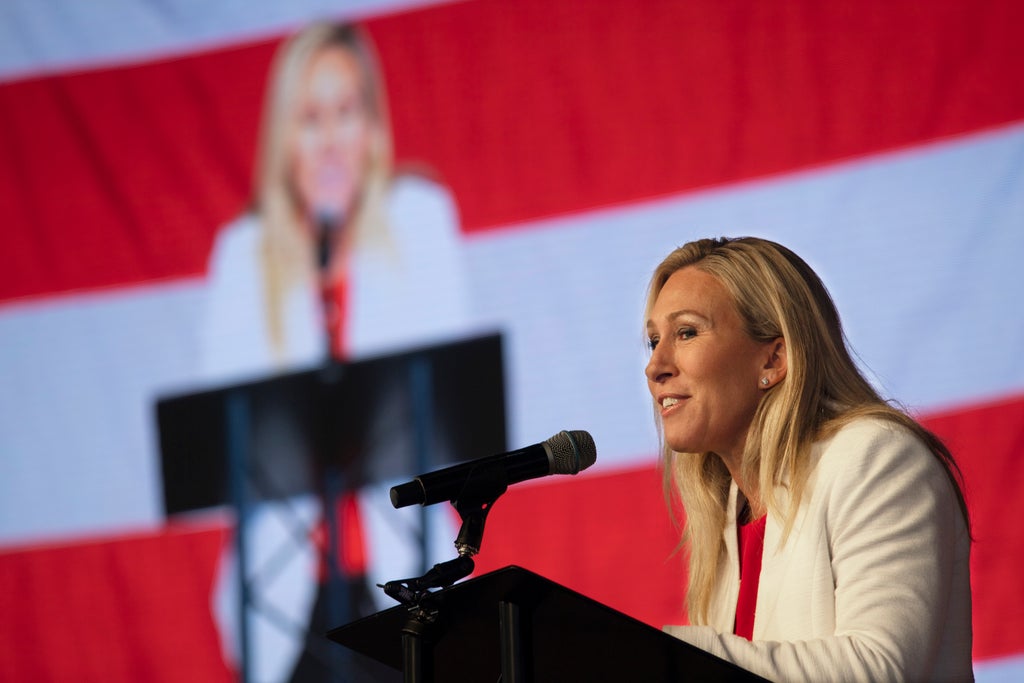
U.S. Rep. Marjorie Taylor Greene is expected to appear at a hearing Friday in Atlanta in a challenge filed by voters who say she shouldn't be allowed to seek reelection because she helped facilitate the attack on the Capitol that disrupted certification of Joe Biden’s presidential victory.
The challenge filed last month says the Republican congresswoman is ineligible to run under a provision of the 14th Amendment to the U.S. Constitution, alleging that she aided and engaged in an insurrection to obstruct the peaceful transfer of power on Jan. 6, 2021.
Greene has repeatedly denied aiding or engaging in an insurrection and has filed a lawsuit alleging that the law the voters are using to challenge her eligibility is itself unconstitutional. She is set to appear on the Republican ballot for Georgia's May 24 primary and has been endorsed by former President Donald Trump.
In a statement Thursday, Trump incorrectly blamed Georgia Gov. Brian Kemp and Secretary of State Brad Raffensperger, both Republicans, for allowing the challenge against Greene, saying she is “going through hell in their attempt to unseat her.”
In fact, the challenge to Greene's eligibility to run for reelection was filed by five voters who live in her district, and the procedure for such a challenge is outlined in Georgia law.
The law says any voter who's eligible to vote for a candidate can challenge that candidate's qualifications by filing a written complaint with the secretary of state within two weeks after the deadline for qualifying. The secretary of state then has to request a hearing before an administrative law judge. That hearing is scheduled for Friday.
After the hearing, the administrative law judge is to present his findings to Raffensperger, who then must determine whether Greene is qualified.
Raffensperger and Kemp both attracted Trump’s wrath shortly after the 2020 election when they refused to take steps to overturn Trump’s narrow loss in the state. They’re both now facing primary challenges from Trump-endorsed candidates.
The 14th Amendment says no one can serve in Congress “who, having previously taken an oath, as a member of Congress . . . to support the Constitution of the United States, shall have engaged in insurrection or rebellion against the same.” Ratified shortly after the Civil War, it aimed to keep representatives who had fought for the Confederacy from returning to Congress.
In their complaint, the voters cited tweets and statements Greene made before, during and after the riot. The complaint says Greene helped plan the riot and/or the demonstration and march on the Capitol that preceded it, knowing that it was “substantially likely to lead to the attack, and otherwise voluntarily aided the insurrection.”
Greene filed a federal lawsuit earlier this month asking a judge to declare the law allowing voters to challenge a candidate's qualifications unconstitutional and to prohibit state officials from enforcing it. U.S. District Judge Amy Totenberg in Atlanta on Monday declined a request from Greene to halt the challenge process while the lawsuit plays out. Greene is appealing that ruling.
The Georgia complaint was filed on the voters' behalf by Free Speech for People, a national election and campaign finance reform group. The group filed a similar challenge on behalf of voters in western North Carolina against Republican U.S. Rep. Madison Cawthorn, who spoke at the rally that preceded the riot.
Cawthorn sued and U.S. District Judge Richard Myers last month blocked the challenge filed with the state's election board from moving forward, writing that laws approved by Congress in 1872 and 1898 mean the 14th Amendment section can’t apply to current House members. The 4th U.S. Circuit Court of Appeals will hear arguments in the litigation early next month, two weeks before Cawthorn’s primary election.







